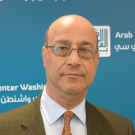Speakers

Karim Mezran
Senior Fellow, Rafik Hariri Center for the Middle East
Atlantic Council

Hani Shennib
Founding President
National Council on U.S.-Libya Relations
Moderator
Event Summary
Arab Center Washington DC (ACW), a nonprofit, independent, and nonpartisan think tank that focuses on US policy and developments in the Arab region, hosted a panel discussion on November 1, 2018 at its offices titled “Seven Years After Qadhafi’s Death: Is Libya Any Closer to Democratic Transition?” The speakers were Karim Mezran, Senior Fellow at the Atlantic Council’s Rafik Hariri Center for the Middle East; Hani Shennib, Founding President of the National Council on U.S.-Libya Relations; and Imad K. Harb, Director of Research and Analysis at ACW, who also served as moderator.
Khalil E. Jahshan, Executive Director of ACW, offered introductory remarks. He characterized the situation in Libya as complex owing to rival governments, political divisions, armed factions, a decimated economy, and a difficult security and humanitarian situation. Jahshan referred to the most recent political agreement on November 1st between the Libyan House of Representatives and the High State Council as infusing some cautious optimism among the parties. He speculated that it might represent a new phase of healing in Libya.
Karim Mezran addressed the political aspects of the Libyan issue. He asked, what does a democratic Libya mean? The lack of security and services, he said, has stressed the country. Mezran asserted that the Libyans themselves should not be detached from the process of rebuilding the institutions of the country, or worse, forgotten in the political negotiations. Pluralism, he said, is a process that takes time, and transparency also is needed. He warned that allowing another strongman to take over would be counterproductive and would set the country back. “There is no possibility of serious elections unless you have a semi-stable country,” he continued, adding that it is not necessary to have a constitution before holding elections. As for going forward, Mezran described some possible scenarios: 1) a situation that is more of the same, with some improvements—such as the new agreement, which proposes a presidential council chosen from the three different regions of the country; 2) continuing under the leadership of Fayez al-Sarraj of the Government of National Accord, with no meaningful reforms or elections; 3) a military takeover by an internal or external powerful party; and 4) de facto partition of the country which will lead to instability. Mezran said that the conference in Palermo on November 12-13 could be an important step; if Libyans could agree on a roadmap that is guaranteed by the international community, this would be the “dream scenario.” He affirmed that the US role in Libya is an important one that could leverage pressure on the parties and to ensure the success of the roadmap.
Hani Shennib relayed to the audience the sense that Libyans are fed up with UN-imposed recommendations that generally reflect a poor understanding of the dynamics in the country. He examined recent tensions between the United Nations and Libyan representatives regarding delays in unifying the country through the creation of the new presidential council. After 42 years of “organized chaos” under Muammar Qadhafi, Shennib said, Libya was rendered dysfunctional; indeed, the historical differences between the three principal provinces were never addressed under the highly centralized government in Tripoli which marginalized Benghazi and the eastern part of the country. Qadhafi’s death in 2011 opened the possibility of regaining power in areas that had been neglected since 1969. Shennib noted that Libyans do not want their country to be divided into three states; he advocated for a creative problem-solving that includes Libyan voices—and not one that privileges roles for the United Nations’ Ghassan Salamé or Italy with its colonial history in the country. He concluded that “it’s not about signing the agreement; it’s the morning after,” explaining that appeasing the base in Libya is important, and that the substance of the agreement and how it is implemented are the crucial factors. He urged a solution based on a “federalist” model that is undergirded by the security, economic, and humanitarian needs of the Libyan people.
Imad Harb agreed that the situation in Libya is complicated, citing agreements that are bogged down, a weak Government of National Accord that relies on militias to control the western part of the country, and incursions from Chad and Sudan. He listed the other external interfering parties in Libyan affairs as Egypt, the United Arab Emirates, Algeria, Tunisia, Italy, France, and Great Britain. In particular, he said, Italy is concerned about Libya as a conduit for migrants into Europe. The absence of the United States as an actor is conspicuous; in fact, Harb noted, although Washington has supported UN efforts in the country and has returned its US ambassador there, Secretary of Defense James Mattis recently made remarks that reflected US inattention to Libya.
Event Photos


